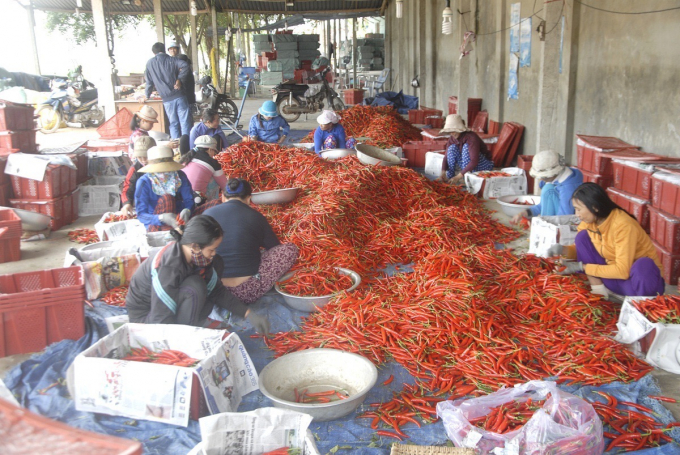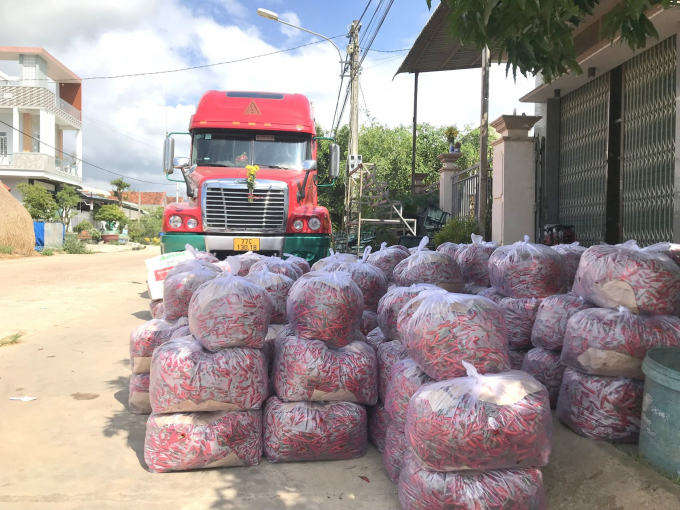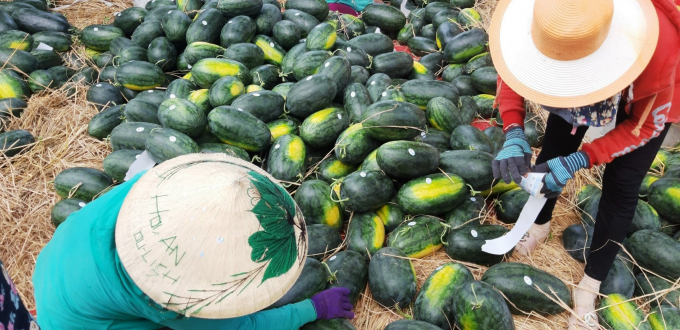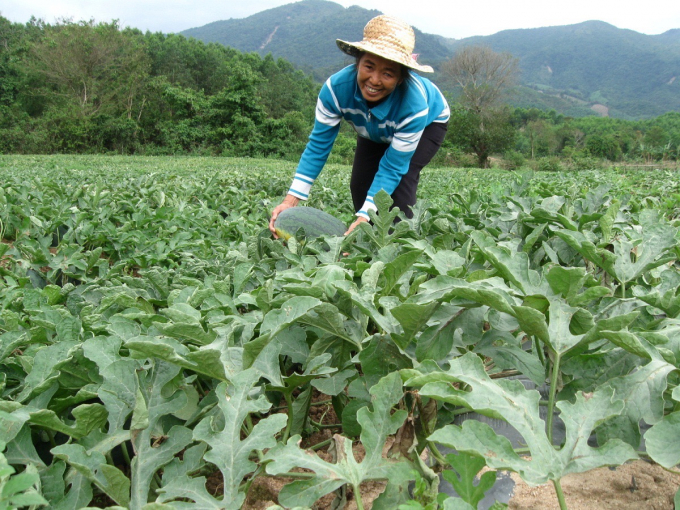May 29, 2025 | 18:19 GMT +7
May 29, 2025 | 18:19 GMT +7
Hotline: 0913.378.918
May 29, 2025 | 18:19 GMT +7
Hotline: 0913.378.918
According to Binh Dinh Department of Agriculture and Rural Development, the province's main agricultural product exports to China are chili and watermelon. Although watermelon production is not encouraged by the functional sector, farmers still spontaneously farm on a large area every year. In 2021 alone, Binh Dinh planted 2,576 hectares of watermelons with an output of 82,615 tons; and 2,596 hectares of chili peppers with an output of 43,523 tons. Most of the watermelons and chili peppers in Binh Dinh are freshly exported to China through unofficial channels at fluctuating prices. Additionally, there is also the high risk of China closing the border gates, causing congestion and a surplus of agricultural products.

Fresh peppers in Binh Dinh were mainly exported to the Chinese market through unofficial channels. Photo: V.D.T.
China is currently applying new regulations on imported agricultural products. Subsequently, agricultural products that want to enter the Chinese market through official channels must obtain a planting area code, packaging facility code, etc. Before China made the aforementioned changes, Binh Dinh's agricultural sector has proactively direct and support farmers to gradually shift to production according to the planning, stabilize planting areas, apply safe farming processes to meet the requirements of official export.
According to Mr. Phan Thanh But, Chairman of Chan Hung Sinh Loi Agricultural Investment Group Joint Stock Company in Ho Chi Minh City, Vietnamese agricultural products have been exported to the Chinese market predominantly through unofficial channels. Unofficial export not only brings risks to businesses, but also directly affect the farmers involved because China is increasingly tightening restrictions on goods imported through unofficial channels.

Binh Dinh has recently requested the Department of Plant Protection to issue a packaging facility code for chili peppers in Phu My district as a basis to export to the Chinese market. Photo: V.D.T.
Mr. But emphasized: China is a very promising market for Vietnamese agricultural product exports, especially fruits. Agricultural products exported from Vietnam to China currently only meet 5% of the demand of this market. In the past, Sinh Loi Group has exported different products to Singapore, Japan, Korea, and Europe, but the volume of exports to these markets was very low, with less than 3 containers of goods exported per month. However, when exporting to the Chinese market, Sinh Loi Group can reach several hundred tons of goods exported per day. Therefore, Sinh Loi Group aims to export mainly to the Chinese market.
“Sinh Loi Group has signed a contract to sell many agricultural products grown in Hoai An district such as: green-skinned pomelo, red-fleshed jackfruit, waxy banana and watermelon at a floor price to ensure income for producers. We would like Binh Dinh province to quickly promote the development of the planting area code, which is the prerequisite for exporting agricultural products to China through official channels, followed by the packaging facility code. Afterwards, Sinh Loi Group will invite the Chinese authorities to inspect, and if successful, China will grant export quotas for each type of agricultural product. Subsequently, Sinh Loi Group will coordinate with the province to work out the annual production plan as well as the export plan", suggested Mr. But.

Watermelon being stamped for export to China. Photo: V.D.T.
According to the Binh Dinh Sub-Department of Plant Protection, the unit will coordinate with different provinces to review and complete the dossier before submitting to the Department of Plant Protection for the issuance of planting area code for 400 hectares of watermelon. The Department recently proposed to certify 5 qualified fresh chili production areas with a total area of over 200 ha. Additionally, Binh Dinh Sub-Department of Plant Protection will continue to review, finalize and submit the planting area codes for the production areas of peanuts, mangoes and various citrus fruit trees, etc. in accordancewith demand, with the goal of forming raw material areas qualified for official export. By now, Binh Dinh Sub-Department of Plant Protection has requested the Department of Plant Protection to retain 10 eligible planting area codes, revoke 23 ineligible planting area codes; as well as update the information ofthe representative, size of 6 planting areas.

Binh Dinh has recently completed and submitted the dossier to the Department of Plant Protection for the issuance of planting area code for 400 hectares of watermelon. Photo: V.D.T.
“We have also requested the Department of Plant Protection to issue a packaging facility code for chili peppers in Phu My district for export to the Chinese market. Binh Dinh Sub-Department of Plant Protection acts as the consultant, helping the packaging facility in Phu My to meet the standards for exports to China. The functional sector currently has very a procedure for granting planting area codes, with regulations on packaging facility codes included. Every year, we send documents to the Departments of Agriculture and Rural Development, Economic Departments of districts and towns to deploy the planting area codes. If the producers in any locality has a need, they need to appoint a representative for that planting area to apply for a planting area code. Additionally, they must attach the technical process, production log, list of producers and acreage; The Provincial Department of Crop Production and Plant Protection will conduct on-field survey for appraisal, if the area meets the requirements, the unit will send a document to the Department of Plant Protection to apply for a code. The procedures for packaging facility code are also similar”, said Mr. Kieu Van Cang, Binh Dinh Sub-Department of Plant Protection.
“Building and applying for a planting area code is not difficult; but managing, using and promoting the effectiveness of the planting area code is a matter of great concern. Most importantly, the planting area code helps to develop production and improve the quality of agricultural products; and the completion of technical conditions such as proactively building and granting planting area codes will contribute to attracting domestic businesses find Binh Dinh to create linkages for the production and consumption of agricultural products", said Mr. Kieu Van Cang.
Translated by Nguyen Hai Long

(VAN) The mutual export of agrifood products between the European Union (EU) and the United Kingdom (UK) must occur again without certification, border controls or other red tape. This was agreed at the UK-EU summit.
/2025/05/22/5121-2-173645_677.jpg)
(VAN) NBSAP Tracker identifies strengths and areas for improvement in the National Biodiversity Strategy, based on each region’s priorities and capacities.

(VAN) The draft amendment to the Circular on rice export trading stipulates a periodic reporting regime for rice exporting enterprises.

(VAN) Dong Thap farmers attained an average profit margin of 64% during the summer-autumn 2024 crop (first season), while An Giang and Kien Giang farmers followed with 56% and 54%, respectively.

(VAN) As a doctoral student doing research on renewable energy and electrification at Harvard University, the author shares his musings on electricity, nature, and countryside memories.

(VAN) The decree on Extended Producer Responsibility (EPR) ensures transparent management and disbursement of support funds, avoiding the creation of a “give-and-take” mechanism.

(VAN) Hue City rigorously enforces regulations regarding marine fishing and resource exploitation, with a particular emphasis on the monitoring of fishing vessels to prevent illegal, unreported, and unregulated (IUU) fishing.